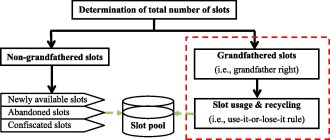
For a private airport, the slot policy may increase the airport’s profit by allowing the airport to transfer some of the negative effects of weak travel demand to airlines. Finally, for airlines with equal access to airport slots, as the substitutability among airlines and/or the number of competing airlines increases, the incentive of slot hoarding decreases.
We examined both the effects of substitutability among carriers and the number of competing carriers on each airline’s slot hoarding behavior. Our analytical results suggest that when the airline has to hoard slots, it chooses to operate more flights with smaller aircraft, charge a higher airfare and serve more passengers. The resultant airline profit is decreased. In terms of airport profit, it has been shown that the grandfather policy can increase airport profit when the potential air travel demand is low. As above, it explains why the airport prefers the grandfather policy to the slot ownership scheme. By extending the basic monopoly model to the case of oligopoly airline market, the effects of airline competition on slot hoarding behavior is also examined. It is found that airlines with equal access to airport slots would hoard fewer slots if their flight services are less differentiated. For example, how is the airlines’ slot hoarding behavior affected by slot trading in the secondary markets? Second, one of the major motivations behind slot hoarding behavior is to secure available slots for the future (e.g., option behavior). Therefore, future demand uncertainty plays an important role in determining the airline’s slot hoarding behavior. Third, there is a complementarity between slots at different slot controlled airports. Finally, when considering the effects of competition on slot hoarding behavior, we assume that the competing airlines have equal access to airport slots. In practice, however, airlines slot hoarding behavior may act as a strategic way to deter potential rivals’ entry. Therefore, it is meaningful to also investigate the market entry deterrence problem jointly with airline slot hoarding behavior.
Collected and summarized from the source below by Minh Pham https://db.vista.gov.vn:2095/science/article/pii/S1366554518306744

